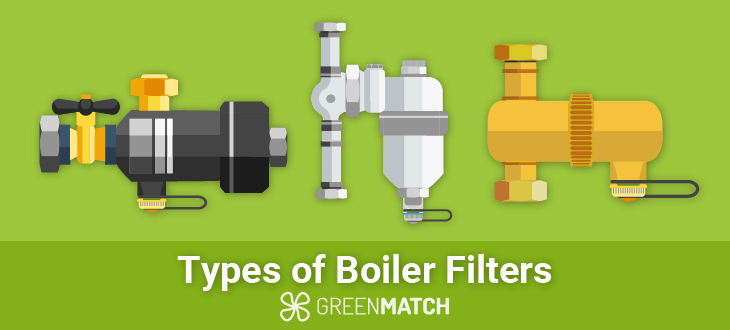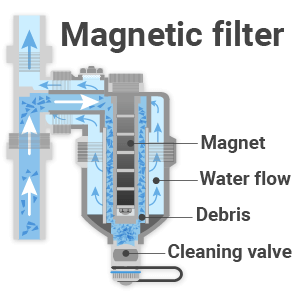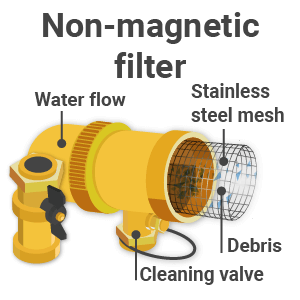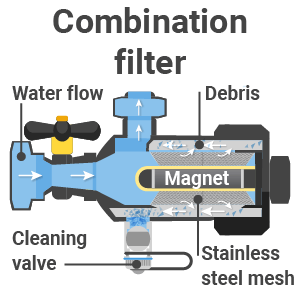Answer these simple questions and we will find you the BEST prices
Which type of solar quotes do you need?
It only takes 30 seconds
100% free with no obligation

Get up to 3 quotes by filling in only 1 quick form

Slash your energy bills by installing an energy efficient boiler

We’ve helped over 500,000 homeowners reduce their carbon footprint
- GreenMatch
- Boilers
- Types of Boiler Filters
Types of Boiler Filters: What You Need To Know


Central heating systems are integral to our daily lives. They heat our hot water and keep our radiators warm when the temperatures outside take a turn. So, these systems must last a long time and work effectively. This is where the role of a boiler filter comes into play.
Boiler filters are small but crucial bits of kit that work within the pipe system to filter out different types of debris and impurities, which can build up over time. They help maintain a healthy heating system but are only sometimes included in your boiler installation as standard.
Understanding whether you need a boiler filter and their differences can be confusing. In this article, we’ll look at the types of filters available, discover why you need one and how they can save you money in the long run.
What is a boiler filter, and do you need one?
A boiler filter (also known as a central heating filter) is a device which is installed into the pipe network of your heating system. Its primary function is to capture any debris or impurities from the water flowing around the pipes before it can get into your boiler.
If this debris enters your boiler, it can create blockages and build-up. This can cause your boiler to break down, resulting in costly repairs. When a boiler suffers from heavy build-up (or ‘sludge’), it can lose efficiency, which also means it won’t perform as well as it should - costing you more energy to run it!
You may even have to pay for a complete system power flush if there is a severe blockage. This entails an engineer pumping chemicals through the whole heating system, which can take up to 10 hours. In the worst-case scenario, you may have to replace your system if the damage can't be treated.
Regardless of your boiler type, it’s highly recommended that you use a boiler filter. Avoiding impurities or sludge getting to your boiler will ensure its long life and won’t let you down when you need it the most.
Types of boiler filters
There are 3 types of boiler filters: magnetic, non-magnetic and combination.

Magnetic filters
These are the most commonly used filters for central heating systems. As the name suggests, these filters use magnets to attract metallic debris and particles. The filter will collect and store them outside of the pipework to easily remove them.
Metallic debris happens when metals inside the heating system corrode over time. Oxygen in water can react with metals, such as steel in radiators or pipework, and can cause chips and particles to dislodge. These waste materials can disturb water flow and eventually cause build-up.

Non-magnetic filters
Filters which do not contain magnets fall into this category, as they use other materials or mechanisms to filter out waste.
One typical example is a stainless steel mesh filter designed to capture a broader range of particles, including sand and silt. These particles are often found in sediment from natural water supplies and can, therefore, find their way into a boiler system.
Non-magnetic filters are a good option for settings where magnetisation is inappropriate, such as where they might interfere with other equipment.

Combination filter
These filters can capture both magnetic and non-magnetic materials at once. Typically, these will combine a powerful magnetic filter with a stainless steel filter to capture the most debris.
With a combination filter, you get the benefit of both filtering techniques which can greatly increase the efficiency of your whole system.
Benefits of central heating filters

Central heating filters are a small but crucial part of keeping our homes warm and our boiler systems reliable. We know they can remove harmful waste materials from the water pipes, but there are many other benefits to enjoy when installing a filter.
Boiler filters, particularly magnetic filters, offer several benefits that can help improve the efficiency and longevity of your heating system. Here are some of the benefits of using a boiler filter:
1. Improved efficiency
Using a magnetic filter can improve the operation of your boiler, making it significantly more efficient. As your boiler uses less energy, you’ll be lowering your carbon footprint, which can also mean annual savings on your energy bills.
2. Longer boiler life:
As the filter helps to keep your system healthy, it means there is less stress on the boiler's parts. This can keep your boiler running for many more years to come.
3. Reduce repair costs:
A boiler filter will help prevent blockages that can lead to unexpected breakdowns and costly repairs. By removing debris from the system, a filter can also control the need for a total power flush or expensive boiler replacement.
4. Easy maintenance:
A filter can assist greatly in maintaining your boiler system, as it is easy to empty and clean the filter rather than the whole system.
5. Easy installation:
Boiler filters can be added to a heating system efficiently and require little maintenance. This makes them a worthwhile solution to increase the lifespan and performance of your boiler.
6. Warranty increase:
Some boiler manufacturers offer an extended warranty if you install a filter alongside your boiler purchase. This gives you added protection should anything happen to your boiler.
How is a boiler filter installed?
Fitting a central heating filter into your system is straightforward and shouldn’t take too long.
However - we always recommend getting advice from a professional engineer before attempting any work on your heating system. Not only can this lead to injury, but it can also result in a void warranty!
If you do have a filter installed, here are the steps you can expect:
- The engineer will turn off the boiler and water supply and wait for the system to cool down.
- They will locate a suitable section of pipework to install the filter. This is usually on the pipe which returns water to the boiler.
- Once located, a section of the pipe will be cut out large enough for the filter to be installed.
- Depending on the type of filter being used, specialised fittings and connections may be installed on the pipes, such as threaded connections.
- Next, the filter will be installed into the space (ensuring it follows the direction of the water flow) and tightened via the connections.
- Once installed, the engineer will check it is secure and turn the boiler back on, checking for leaks.
- The filter is now ready and running! After that, regular checks will need to be made to clean out the filter when required.
These steps will vary depending on the type of filter and the system setup you have at home. It’s highly recommended that you get a professional opinion to ensure you get the right filter for your boiler.
Are boiler filters worth using?
Boiler filters may seem like small, unnoteworthy devices, but they can offer significant advantages for your home heating system. Their impact is threefold: they enhance energy efficiency, lower maintenance boiler costs, and reduce annual bills, all while extending the lifespan of your boiler.
By removing impurities and sludge from the circulating water, filters enable your boiler to operate optimally. This cleaner system can create heat more effectively, resulting in quicker heating and less energy wastage. Installing a boiler filter means your boiler doesn’t work as hard to maintain temperatures, leading to substantial energy savings.
With a filter in place, you can reduce the risk of costly maintenance and repairs by preventing blockages and damage to critical components. With these risks minimised, your boiler's lifespan will increase, meaning fewer repairs and lower overall maintenance expenses.
In addition, the cleaner and more efficient operation of your boiler through a filter will result in lower annual energy bills. By incorporating this one small element into your heating system, you can enjoy benefits that will last many years.

Becky is an experienced SEO content writer specialising in sustainability and renewable trends. Her background in broadcast journalism inspires reliable content to help readers live more sustainably every day.
We strive to connect our customers with the right product and supplier. Would you like to be part of GreenMatch?





